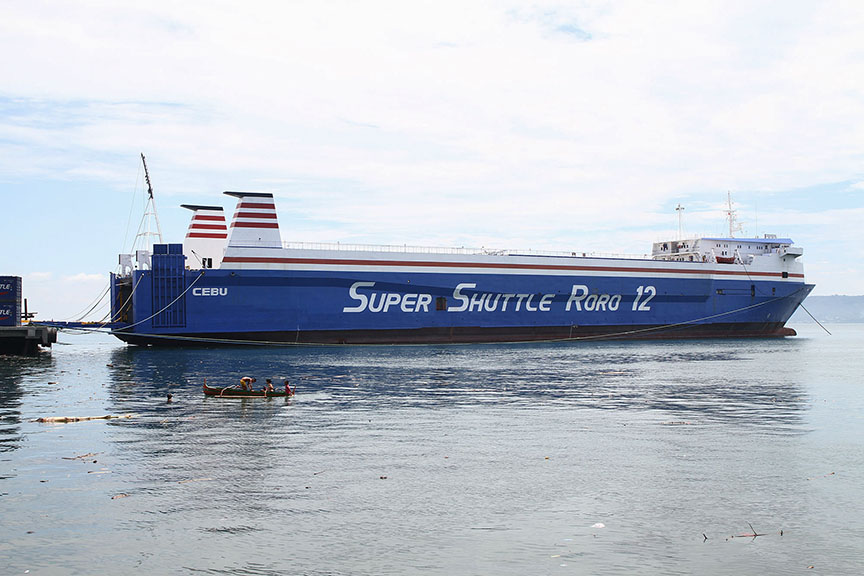 The Super Shuttle Roro 12 at the KTS Port in Sasa, Davao City. Mindanews Photo
The Super Shuttle Roro 12 at the KTS Port in Sasa, Davao City. Mindanews Photo
DAVAO CITY (MindaNews / 28 April) – The operation of the Davao-General Santos-Bitung, Indonesia roll on/roll off (RORO) Shipping Service starting on April 30 will decongest port traffic in Manila, an official of the Mindanao Development Authority (MinDA) said.
In a press conference on the launch of the Davao-GenSan-Bitung sea route at the Apo View Hotel Davao Friday, Eamarie M. Gilayo, development management officer III at the MinDA, said government intends to ease out the traffic at the ports in the country’s capital aside from creating economic activities with the opening of this new sea connectivity.
She said exporters from Luzon and Visayas have either committed or signified interest to use the Davao-GenSan-Bitung route that offers a shorter travel period of one to two days.
The route also provides a “better alternative” to existing route connecting Manila to Bitung via Jakarta.
Gilayo said there are 5 to 10 large companies who will use the initial voyage of the Cebu-based Asia Marine Transport Corp.’s M/V Super Shuttle RORO 12 with a 500-TEU capacity owned by businessman Paul Rodriguez.
Among the goods to be traded include animal feeds, aqua products, charcoal, coffee beans, construction materials, copra, feed ingredients, fertilizers, food and beverages, fresh fruits, ice cream products, meats, peanuts, poultry (halal), soya, sugar, and synthetics.
Goods that won’t be traded include gift toys, housewares, electronics, pharmaceuticals, and fresh fruits due to some quarantine and trade issues.
On security concerns, Gilayo said the security will also be tightened to ensure the safety of the vessel.
She said government forces have give their assurance to secure the route as the vessel starts voyage on Sunday.
Dr. Maria Lourdes Monteverde, former president of Davao City Chamber of Commerce and Industry Inc. (DCCCII), said the business sector will ask for subsidy from the Philippine government in a form fuel and tax exemptions to ensure the sustainability of the sea route and to support the operations of the shipping line.
She said they will also ask both countries to lift the tariffs to allow a freer trade, although some exporters in the initial trading period will be tax exempt.
The goods from the Philippines, she said, will be necessary to support the operations of the large Filipino fishing companies based in Indonesia while some raw materials that are available in Bitung will be exported to Mindanao.
Monteverde is optimistic the sea route will be sustained as there are businessmen who signified the interest to increase the volume of goods that will be transshipped to Davao and General Santos City before going to China.
Exporters can cut cost of shipping to P34,713 twenty-foot-equivalent unit (TEU), or 68 percent lower, from P109,098 with the Davao-Manila-Jakarta-Bitung route that takes about three to five weeks of travel period.
A feasibility study was conducted by Japan International Cooperation Agency (JICA), in collaboration with the United States Agency for International Development (USAID) and the Research Education and Institutional Development Foundation (REID), on the sea route in 2010 as part of the ASEAN (Association of Southeast Asian Nations) Connectivity Plan.
MinDA chair Abdul Khayr Alonto said Mindanao is already catching up with the rest of the country with the launch of the Davao-GenSan-Bitung route, as it can unlock the economic potentials of the island, now being poised as the gateway of the Philippines to the ASEAN neighbors and the world.
On Sunday, President Rodrigo R. Duterte and Indonesian President Joko Widodo will fly to Davao City from Manila after the ASEAN Summit on April 26 to 29.
Alonto believes the new sea route will not only benefit the big exporting companies in Mindanao but also the small and medium entrepreneurs by encouraging them to produce products catering not only the domestic market but also ASEAN’s.
He said this will present economic opportunities for the people in the Autonomous Region in Muslim Mindanao (ARMM) and other underdeveloped parts of Mindanao.
He said it will also strengthen cooperation and collaboration not only in the Brunei-Indonesia-Malaysia-Philippines East Asean Growth Area (BIMP-EAGA) but also the ASEAN. (Antonio L. Colina IV / MindaNews)
